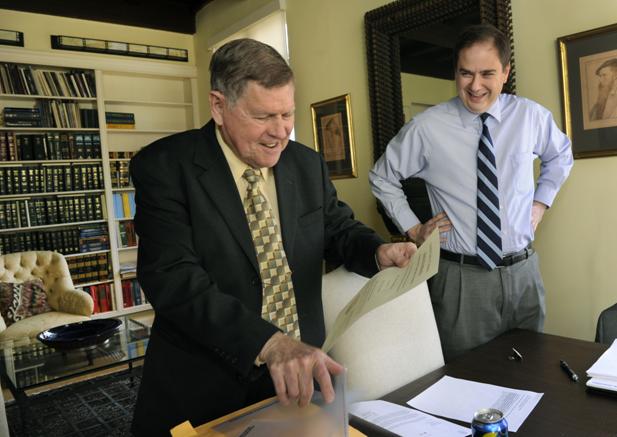A law means this. Or it means that. Who says?
On the first day of last month, Roy Grimes got a call from his attorney. The president had pardoned him for a petty, 52-year-old crime.
Grimes, 72 years old, was happy. He felt redemption and shouted a couple of hallelujahs and thought about his future.
Now, though, "things aren't as rosy as they seemed back on March 1," Grimes said last week.
Beyond the obvious sentimental value, Grimes applied for the pardon because he wanted to collect handguns. He always loved the classic Western heroes, like Marshal Matt Dillon on "Gunsmoke."
But, although President Barack Obama may have forgiven, Tennessee hasn't forgotten. It says not even a federal pardon will let Grimes own guns.
In December 1960, police arrested Grimes for altering a money order worth $40.83 and depositing it at a post office in East Ridge. He got 18 months' probation and settled down. He never committed another crime.
It took more than two years for Grimes, of Athens, Tenn., to hear a response to his pardon application. But it came, and he figured he could finally buy a gun.
His attorney, Patrick Noel, checked with the Tennessee Bureau of Investigation, just to make sure. Its response: Nope.
Now Noel and Grimes aren't sure what they will do.
"What is the value of a presidential pardon?" Noel asked, a question at the center of a debate that one day could find Grimes in a court case against his home state.
TBI officials say Grimes can't possess a handgun because he once committed a felony. The pardon doesn't matter, regardless of who issued it. That's the law, they say. Except that it isn't, other lawyers say.
The TBI points to Tennessee Code Annotated 39-17-1307(c)(1). It reads, "A person commits an offense who possesses a handgun and has been convicted of a felony."
The law says nothing about restoring gun rights through pardons or any other way.
The law means that. Or it means this: If you commit a felony and then you are pardoned, you can own a gun. That's the opinion of former Assistant U.S. Attorney General Walter Dellinger, speaking on behalf of the Bill Clinton administration.
Facing this same issue in 1995, Dellinger wrote that a state cannot deny someone's right to own a firearm if the president has pardoned that person. The U.S. Constitution gives the president this right to pardon, and under the Supremacy Clause, states cannot override the federal government.
The law means that. Or it means this: Dellinger's 18-year-old opinion does not apply in this case. The TBI cites a law passed by the Tennessee General Assembly in 2008. The Senate approved it 26-0; the House did so 87-3, with three representatives abstaining.
"The state law changed since the opinion was rendered in 1995," TBI spokeswoman Kristin Helm wrote in an email. "Mr. Grimes received his pardon after that law was passed."
Said Margaret Love, the U.S. pardon attorney from 1990-97: "How could that possibly make any difference? The holding of the opinion is that a presidential pardon removes automatic disabilities imposed by state law based on the pardoned conviction. Period."
Now, a similar case sits in the Tennessee Court of Appeals. In 1989, David Blackwell was convicted of three felony drug offenses in Georgia. He served five years in prison and four on probation. In 2003, Georgia pardoned him. Then he moved to Tennessee.
Like Grimes, he thought he could get a gun, but he wanted to make sure. And like Grimes, he learned he couldn't, not here, no way.
Tennessee Attorney General Robert Cooper said in 2009 that state law prevents someone convicted of a felony drug offense from possessing a handgun, even if that person had been pardoned in another state.
Blackwell's attorney, David Raybin, says that doesn't make sense. If Tennessee congressmen passed a law that chokes off the power of the pardon, is that not the legislative branch intruding on the rights of the executive branch? Is that not why the Constitution called for a separation of powers?
If so, what's the power of the pardon? What's the point?
"They're saying it's worthless," Raybin said. "They're saying it's just a piece of paper. That's it."
One day, Grimes will be allowed to buy a handgun. Or he won't.
This, or that.
Contact Tyler Jett at tjett@timesfreepress.com or 423-757-6476.

